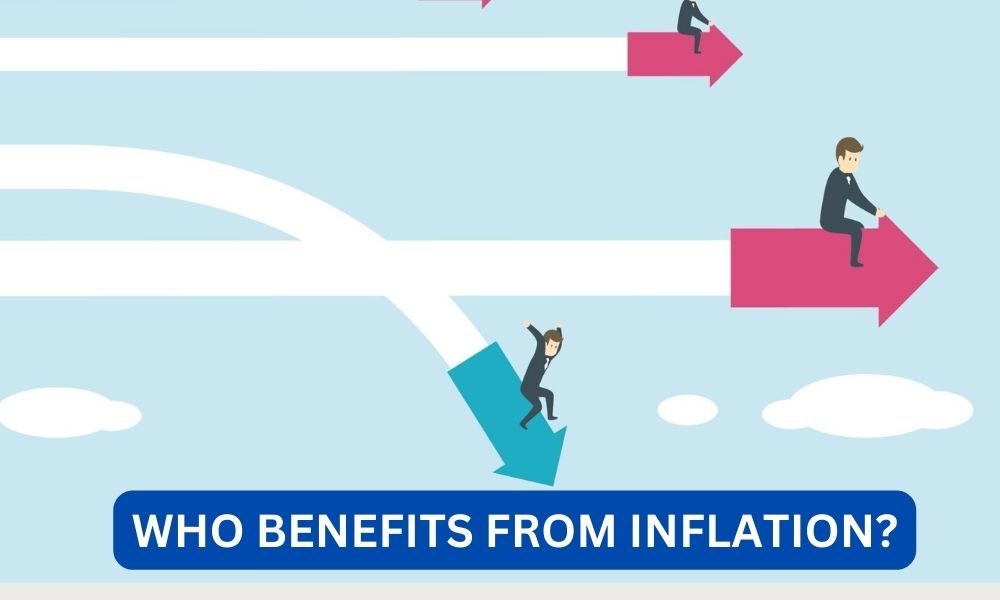Inflation is a term that is often thrown around in discussions about the economy, but what exactly does it mean? In simple terms, inflation is the general increase in prices of goods and services over time. This means that the purchasing power of a currency decreases, and it takes more money to buy the same amount of goods or services. Inflation is measured by the inflation rate, which is the percentage change in the overall price level of goods and services in an economy over a period of time.
Inflation is a natural part of any economy and is influenced by various factors such as supply and demand, government policies, and global events. While moderate levels of inflation can be beneficial for economic growth, high levels of inflation can have negative consequences for individuals, businesses, and the overall economy. In this article, we will explore who benefits from inflation and who is negatively affected by it.
Contents
The Winners of Inflation
1. Borrowers
One of the main beneficiaries of inflation are borrowers. When inflation occurs, the value of money decreases, which means that the amount of money borrowed today will be worth less in the future. This is beneficial for borrowers as they are able to pay back their loans with money that is worth less than what they borrowed. For example, if someone takes out a loan of $100,000 at a 5% interest rate, but inflation is at 3%, the borrower is essentially paying back the loan with money that is worth $97,000 in today’s dollars.
Read:what is social security benefits based onThis is particularly advantageous for borrowers who have fixed-rate loans, as the interest rate remains the same throughout the loan term. This means that as inflation rises, the real interest rate (the nominal interest rate minus the inflation rate) decreases, making it easier for borrowers to pay back their loans.
2. Debtors
Similar to borrowers, debtors also benefit from inflation. Debtors are individuals or businesses who owe money to others. As inflation occurs, the value of the money they owe decreases, making it easier for them to pay back their debts. This is especially beneficial for debtors who have large amounts of debt, such as governments or corporations.
For example, if a government has a debt of $1 billion and inflation is at 3%, the real value of the debt decreases by $30 million. This means that the government only has to pay back $970 million in today’s dollars, making it easier for them to manage their debt.
3. Asset Owners
Inflation can also benefit individuals who own assets such as real estate, stocks, and precious metals. As the general price level of goods and services increases, the value of these assets also increases. This is because the assets are priced in the currency, and as the value of the currency decreases, the price of the assets increases.
Read:What age for full social security benefits: All you need to knowFor example, if someone owns a house worth $500,000 and inflation occurs at a rate of 3%, the value of the house will increase to $515,000 in one year. This means that the owner has gained $15,000 in value without having to do anything. Similarly, if someone owns stocks in a company, the value of their stocks will increase as the company’s profits increase due to inflation.
The Losers of Inflation
1. Savers
While borrowers and debtors benefit from inflation, savers are on the losing end. Savers are individuals who save their money in bank accounts, certificates of deposit (CDs), or other low-risk investments. As inflation occurs, the value of their savings decreases, and they are able to buy fewer goods and services with the same amount of money.
This is because the interest rates on savings accounts and CDs are usually lower than the inflation rate. This means that the interest earned on their savings is not enough to keep up with the rising prices of goods and services. As a result, savers may see a decrease in their purchasing power over time.
2. Fixed-Income Earners
Fixed-income earners are individuals who receive a fixed amount of income, such as retirees who rely on their pension or individuals who have fixed annuities. As inflation occurs, the purchasing power of their fixed income decreases, and they are not able to buy as much as they could before.
Read:How do i find out my social security benefit amountThis is because their income remains the same, but the prices of goods and services increase. This can be particularly challenging for retirees who may not have the ability to increase their income to keep up with inflation.
3. Low-Income Individuals
Inflation can also have a negative impact on low-income individuals. As the prices of goods and services increase, low-income individuals may struggle to afford basic necessities such as food, housing, and healthcare. This can lead to a decrease in their standard of living and can make it difficult for them to make ends meet.
Additionally, low-income individuals may not have access to investments or assets that can protect them from the effects of inflation. This means that they are more vulnerable to the negative consequences of inflation.
The Role of Government in Inflation
The government plays a crucial role in managing inflation through its monetary and fiscal policies. The central bank, such as the Federal Reserve in the United States, is responsible for setting interest rates and controlling the money supply in the economy. The government, on the other hand, can influence inflation through its fiscal policies, such as taxation and government spending.
In times of high inflation, the government may implement contractionary monetary and fiscal policies to reduce the money supply and decrease spending. This can help to bring down inflation rates and stabilize the economy. However, these policies can also have negative consequences, such as a decrease in economic growth and an increase in unemployment.
On the other hand, during times of low inflation or deflation (a decrease in the general price level), the government may implement expansionary monetary and fiscal policies to stimulate economic growth and increase inflation. This can benefit borrowers, debtors, and asset owners, but it may also lead to an increase in the cost of living for savers and fixed-income earners.
Real-World Examples of Inflation
To better understand who benefits from inflation, let’s take a look at some real-world examples.
1. Germany’s Hyperinflation
One of the most extreme examples of inflation is Germany’s hyperinflation in the 1920s. After World War I, Germany was forced to pay reparations to the Allied powers, which led to a significant increase in the money supply. This, combined with a decrease in production due to the war, caused hyperinflation to occur.
At its peak, the inflation rate reached 29,500% per month, meaning that prices were doubling every two days. This had a devastating effect on the German economy and its citizens, particularly those on fixed incomes and those who had savings in the form of cash. However, borrowers and debtors were able to benefit from the hyperinflation as they were able to pay back their loans with money that was worth significantly less.
2. The United States in the 1970s
In the 1970s, the United States experienced high levels of inflation due to a combination of factors, including rising oil prices, increased government spending, and loose monetary policies. This led to an inflation rate of over 13% in 1979, which had a significant impact on the economy and its citizens.
During this time, borrowers and debtors were able to benefit from the high inflation rates, while savers and fixed-income earners saw a decrease in their purchasing power. The government eventually implemented contractionary policies to bring down inflation, but this also led to a recession and high unemployment rates.
Conclusion:
Inflation is a complex economic concept that can have both positive and negative effects on individuals and the economy as a whole. While borrowers, debtors, and asset owners may benefit from inflation, savers, fixed-income earners, and low-income individuals may be negatively affected. The government plays a crucial role in managing inflation, but its policies can also have unintended consequences. It is important for individuals to understand the impact of inflation on their finances and to make informed decisions to protect themselves from its effects.
As with any economic phenomenon, there are winners and losers when it comes to inflation. By understanding who benefits and who is negatively affected by inflation, individuals can better prepare themselves for its impact and make informed financial decisions.









